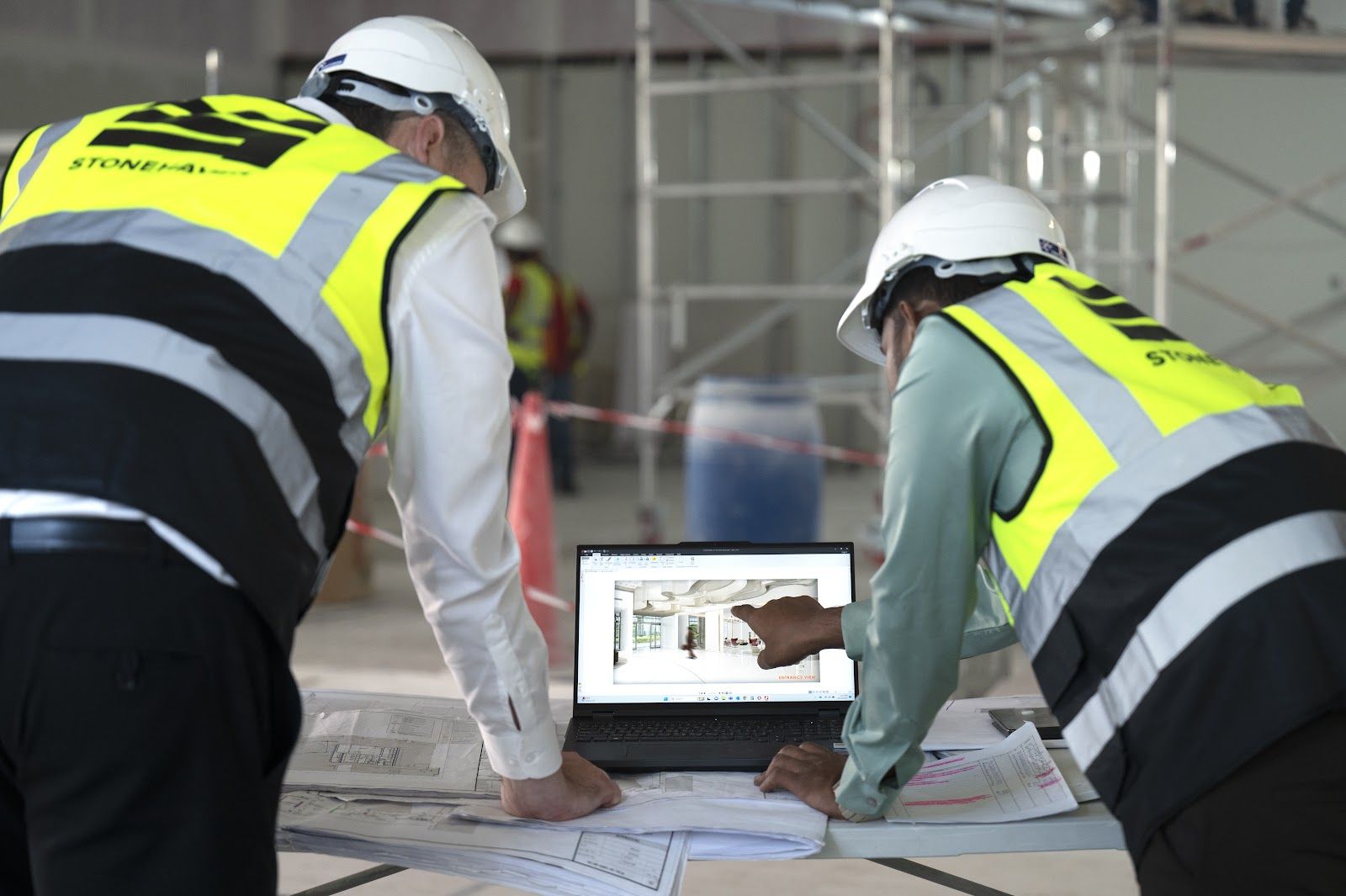From towering skyscrapers and sprawling highways to water treatment plants and transportation systems, civil engineers ensure that projects are safe, functional, and built to last. But in an era of rapid urbanisation and technological advancement, civil engineering is more critical than ever—especially within the Engineering, Procurement, and Construction (EPC) industry.
EPC projects rely on a seamless workflow where engineering design, procurement of materials, and construction execution are managed under a single contract. Civil engineers play a pivotal role in ensuring project feasibility, cost efficiency, and regulatory compliance. Without them, large-scale construction projects would face significant risks, such as structural failures, budget overruns, and environmental hazards.
Moreover, as cities grow and sustainability becomes a priority, civil engineers are expected to integrate innovative construction techniques, smart materials, and eco-friendly solutions into their designs. The future of construction is changing, and civil engineers must lead the charge in ensuring that EPC projects meet modern standards of safety, efficiency, and sustainability.
In this article, we’ll explore why civil engineering is indispensable for EPC projects, which specialisations are most in demand, and how hiring a civil engineering firm can add value to your next venture.
Why is Civil Engineering Important in 2025?
Civil engineering is one of the oldest and most significant engineering disciplines. It is responsible for designing, constructing, and maintaining the infrastructure that supports modern civilisation. Without civil engineers, cities would lack roads, bridges, tunnels, water systems, and safe buildings—all fundamental aspects of daily life.
Civil engineers are at the heart of the Middle East’s construction boom, and by 2025, the demand for their expertise will skyrocket. For example, Saudi Arabia’s construction sector is on track to grow 5% annually, creating massive opportunities for EPC specialists, engineers, and urban planners.
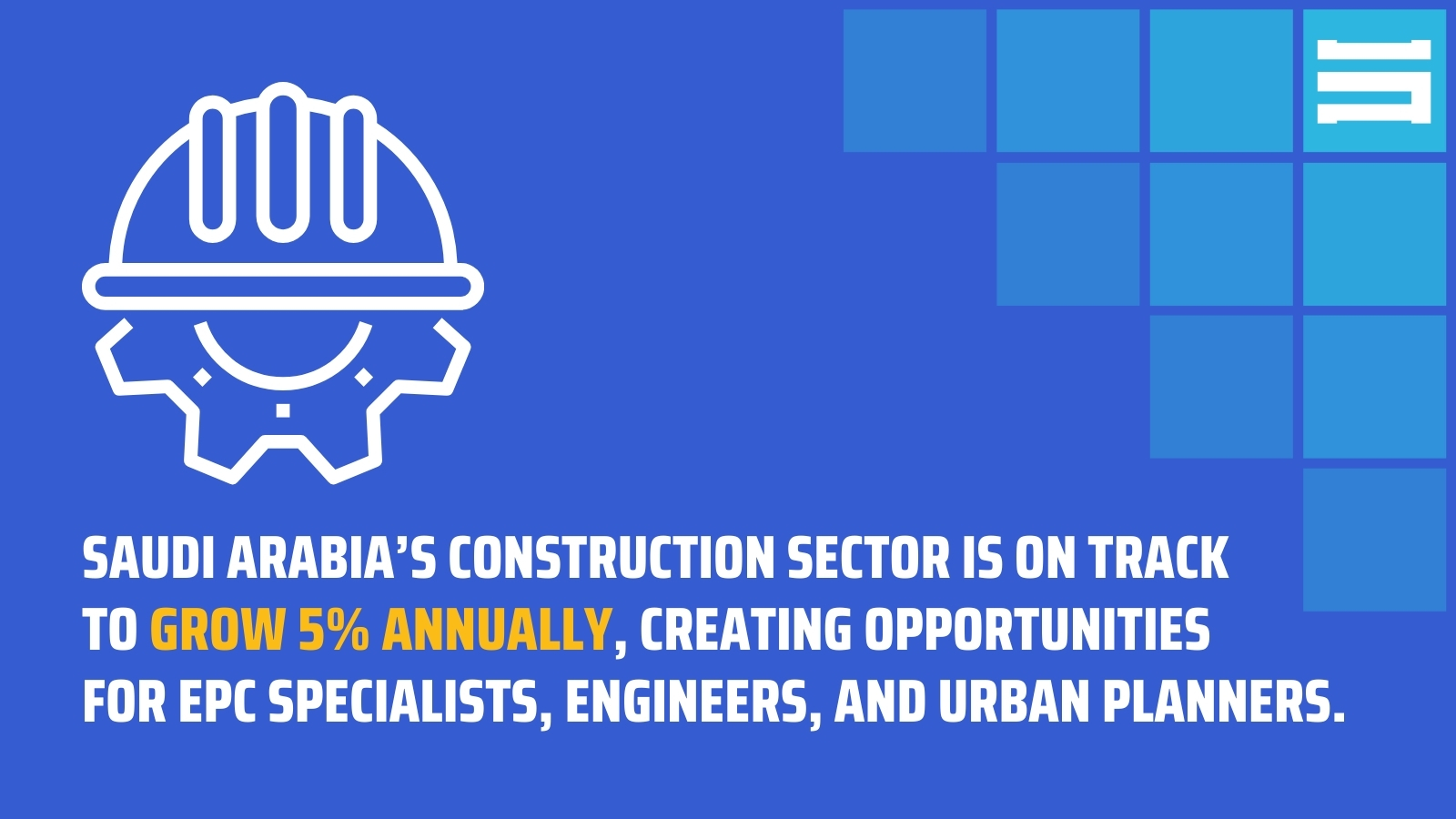
In EPC construction, civil engineering plays a crucial role in:
-
Cost-Effective Project Execution – Through strategic planning and material optimisation, civil engineers help EPC companies reduce costs and prevent construction delays.
-
Ensuring Structural Integrity – Civil engineers design stable and resilient structures that withstand natural disasters and environmental stressors.
-
Sustainability & Efficiency – Modern construction requires energy-efficient, sustainable solutions. Civil engineers implement green technologies, smart materials, and innovative construction techniques to meet these evolving demands.
-
Regulatory Compliance – Every construction project must adhere to local building codes, environmental laws, and safety regulations. Civil engineers ensure that projects meet these standards.
The role of civil engineers extends beyond technical execution; they act as problem solvers, innovators, and project managers, ensuring that EPC projects run smoothly from concept to completion. Without their expertise, infrastructure projects would face significant safety risks, inefficiencies, and financial losses.
What Type of Civil Engineer is Most in Demand?
The EPC industry requires a diverse range of civil engineering specialisations, each playing a crucial role in construction execution, safety, and project efficiency. As the demand for large scale projects grows, the following types of civil engineers are in high demand:
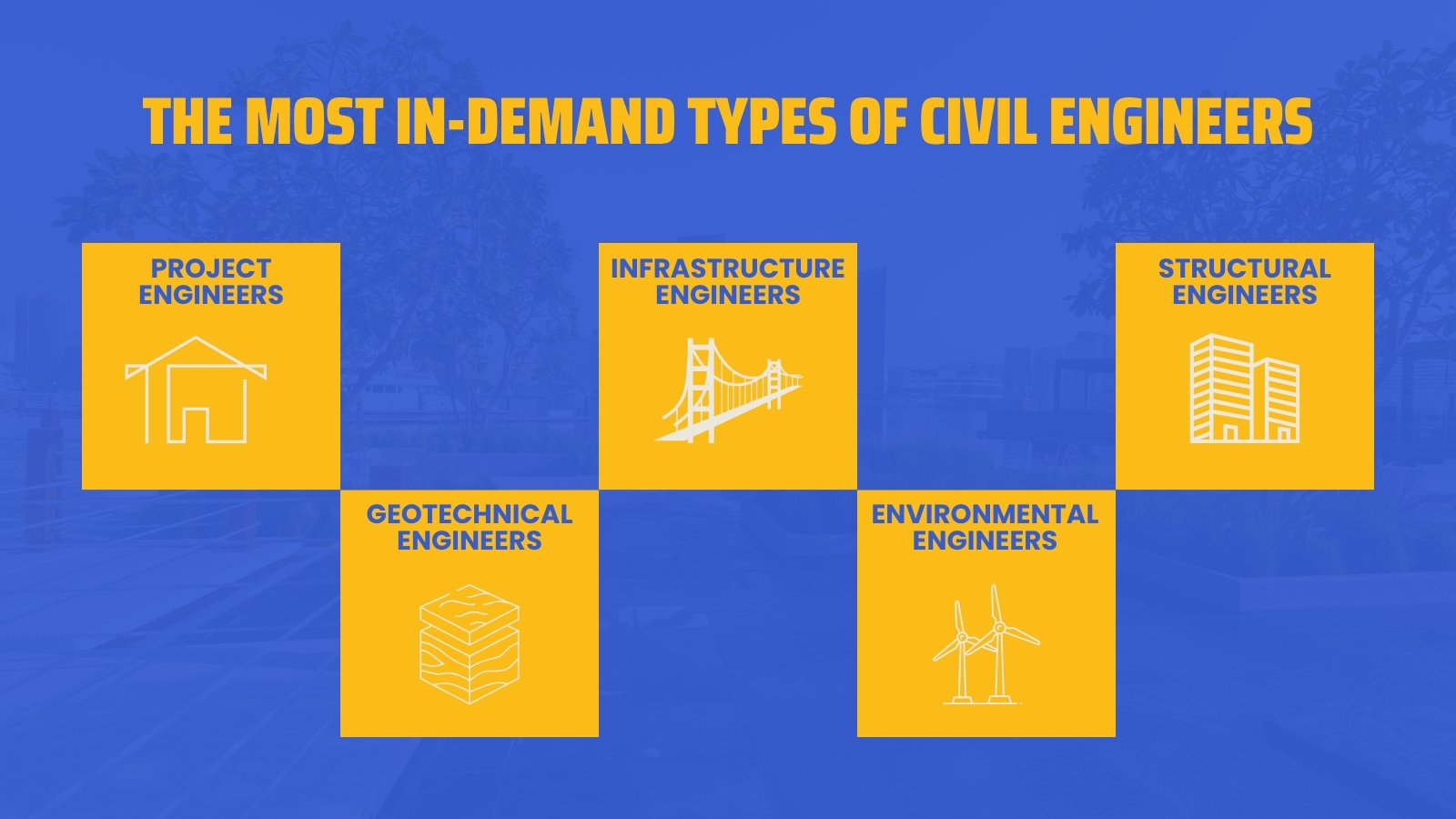
1. Project Management Engineers
Efficient project execution in EPC contracts requires skilled management. Civil engineers with project management expertise handle budgets, schedules, and regulatory approvals to ensure timely and cost-effective completion of projects.
2. Structural Engineers
Structural engineers ensure that buildings, bridges, and industrial facilities are designed for safety and durability. They calculate load-bearing capacities, wind resistance, and seismic forces, making them vital in EPC construction projects that require large-scale infrastructure.
3. Geotechnical Engineers
Before construction begins, geotechnical engineers assess the ground and soil conditions to determine the best foundation design. In EPC projects, their work helps prevent issues like ground subsidence, landslides, and structural instability.
4. Transportation Engineers
With increasing global urbanisation, transportation engineers are in high demand for roadway, railway, and airport construction projects. They ensure that infrastructure projects enhance connectivity, improve traffic flow, and support sustainable urban mobility.
5. Environmental Engineers
EPC is evolving to include sustainable and environmentally responsible building practices. Environmental engineers specialise in waste management, pollution control, and water treatment systems, ensuring compliance with modern sustainability regulations.
The EPC sector, both in the UAE and globally is rapidly growing, making these civil engineering disciplines essential for high-quality infrastructure development.
Which Field of Civil Engineering is Most Important?
Civil engineering encompasses multiple disciplines, but when it comes to EPC projects, some fields are more critical than others. Here are the most important:
1. Civil Project Management
Managing an EPC project requires expertise in scheduling, budgeting, and risk assessment. Civil engineers with project management skills ensure that the project remains within budget and meets all safety and compliance standards.
2. Construction Engineering
This field focuses on project execution, ensuring that designs are accurately translated into physical structures. Construction engineers manage site operations, material logistics, and workforce coordination, making them indispensable to EPC companies.
3. Structural Engineering
Structural engineering is fundamental for EPC projects that involve high-rise buildings, bridges, and industrial plants. Engineers in this field design and analyse structures to ensure that they remain safe under extreme conditions.
4. Geotechnical Engineering
The stability of any structure depends on its foundation. Geotechnical engineers assess soil conditions, drainage, and ground stability to prevent structural failures.
While all civil engineering disciplines contribute to a project's success, structural, construction, and geotechnical engineering are especially critical in EPC contracts.
Why Are Civil Engineers Necessary for Construction?
In any Engineering, Procurement, and Construction (EPC) project, civil engineers play an indispensable role. They bridge the gap between design and execution, ensuring that infrastructure is built efficiently, safely, and in compliance with industry regulations. Their responsibilities go far beyond structural calculations—they also optimise resources, mitigate risks, and introduce sustainable building practices that shape the future of construction.
Key Reasons Why Civil Engineers Are Essential for EPC Construction
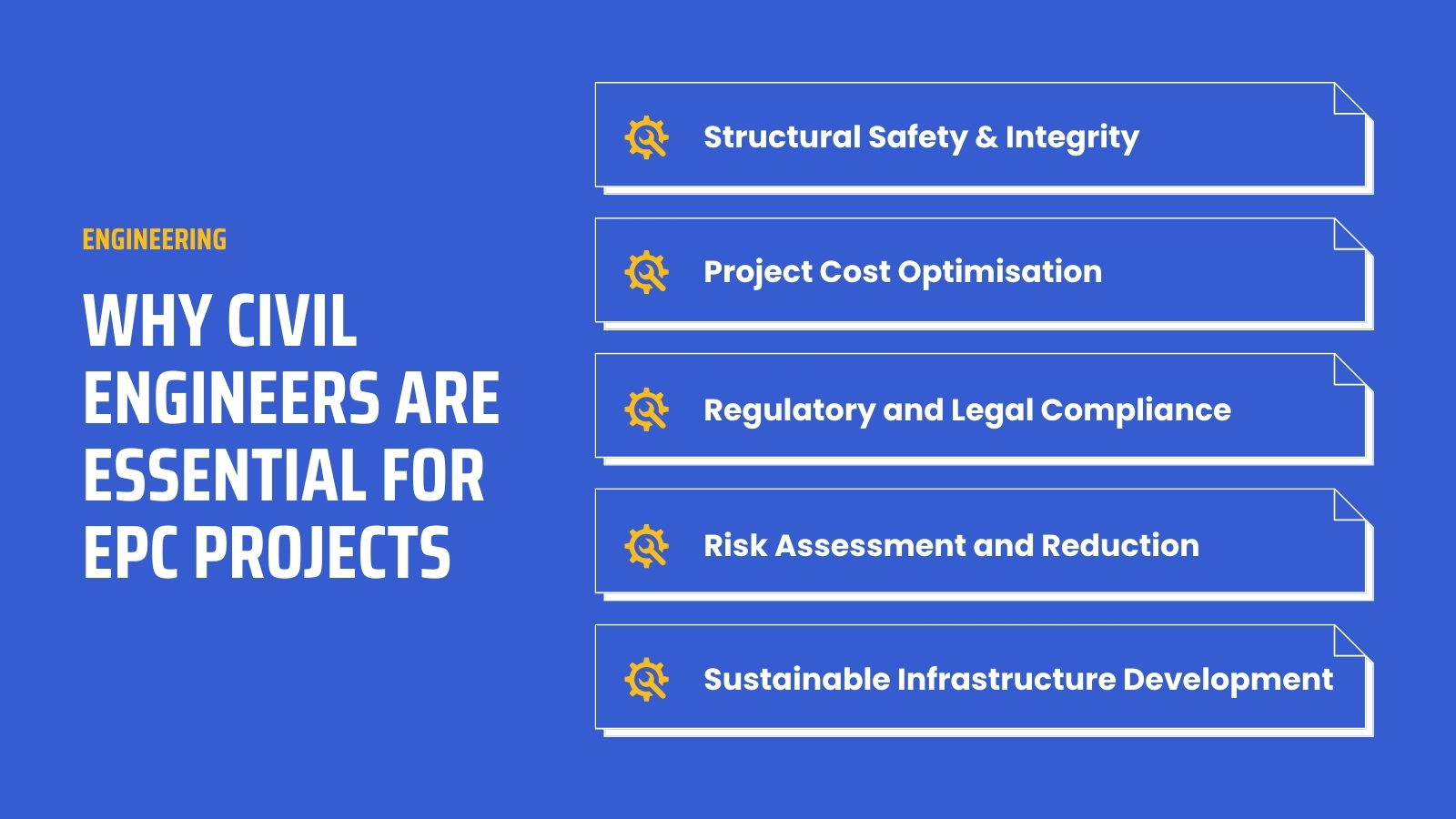
-
Project Cost Optimisation – Large-scale EPC projects require significant financial investment, making cost efficiency a priority. Civil engineers use advanced material selection, design optimisation, and project planning to reduce costs while maintaining quality and performance.
-
Structural Safety & Integrity – Civil engineers are responsible for designing and assessing load-bearing structures to ensure that they can withstand external forces such as wind, seismic activity, and environmental wear. Without their expertise, buildings, bridges, and industrial plants could be structurally unstable and pose safety risks.
-
Regulatory and Legal Compliance – Construction projects must adhere to government regulations, environmental laws, and safety standards. Civil engineers ensure that EPC companies follow local and international construction codes, preventing legal issues and penalties.
-
Sustainable Infrastructure Development – With sustainability becoming a global priority, civil engineers design projects that integrate renewable materials, energy-efficient solutions, and eco-friendly technologies. They ensure that EPC projects meet modern green building standards.
-
Risk Assessment – A poorly designed structure can result in delays, accidents, and cost overruns. Civil engineers conduct risk assessments, geotechnical analysis, and site investigations to pre-emptively identify and address potential issues.
Without civil engineers, EPC contracts would lack the precision, efficiency, and technical excellence required for long-term success. Their expertise ensures that projects are completed on time, within budget, and in compliance with all safety standards, making them a cornerstone of modern infrastructure development.
Why is Civil Engineering Important in 2025 More Than Ever?
The world is evolving at an unprecedented pace, and so is the construction industry. As we step into 2025, the role of civil engineering in EPC projects has never been more critical. With rapid urbanisation, rising environmental concerns, and technological advancements shaping the future of infrastructure, civil engineers must adapt to new challenges and lead innovation in construction.
Key Factors Driving Civil Engineering in 2025
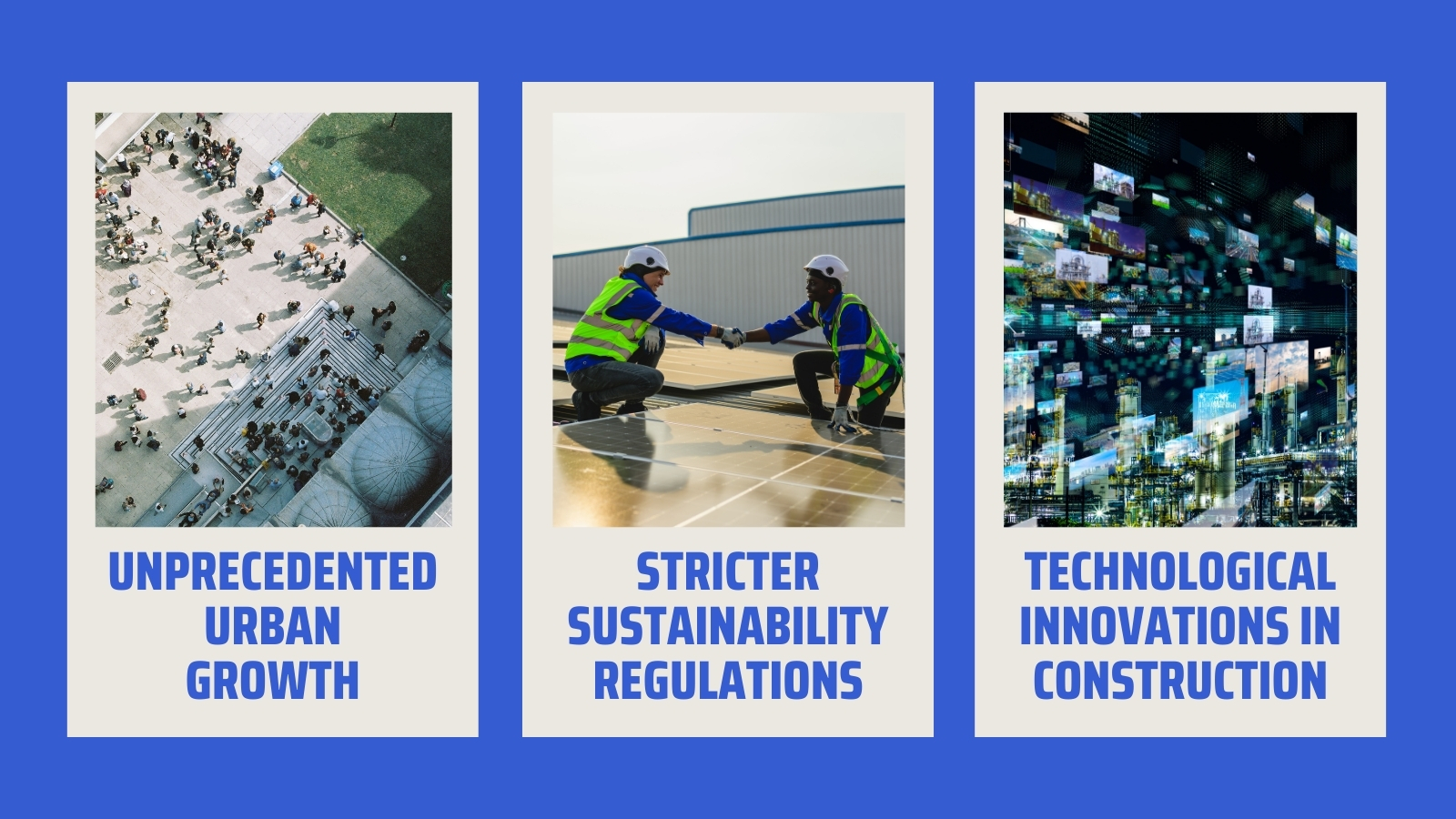
Unprecedented Urban Growth
-
By 2025, nearly 58% of the global population will live in urban areas, increasing the demand for high-rise buildings, transportation networks, and public utilities. By 2030, this figure is expected to reach 60%.
-
Civil engineers will play a crucial role in expanding cities efficiently, planning smart infrastructure, and ensuring sustainable growth.
Stricter Sustainability Regulations
-
Governments worldwide are implementing stricter environmental regulations to combat climate change.
-
Civil engineers are at the forefront of designing energy-efficient buildings, optimising waste management, and integrating renewable materials into construction.
Technological Innovations in Construction
-
Artificial intelligence (AI), automation, and 3D printing are revolutionising EPC construction.
-
Civil engineers will need to adapt to new digital tools like Building Information Modelling (BIM), which enhances planning accuracy and reduces construction waste.
The Future of Civil Engineering in EPC
As construction projects grow in scale and complexity, civil engineers will continue to shape the world by creating safer, smarter, and more sustainable infrastructure. Their expertise will not only support the EPC industry but also drive economic growth, improve quality of life, and contribute to a greener planet.
The future is civil engineering-driven, and 2025 will mark the beginning of an era where EPC projects demand greater precision, sustainability, and innovation than ever before.
Benefits of Hiring a Civil Engineering Firm for Your EPC Project
When executing EPC projects, hiring an experienced civil engineering firm can mean the difference between project success and costly delays. A professional civil engineering team ensures that every aspect of a project—from design and procurement to construction and final execution—meets the highest industry standards.
Key Advantages of Partnering with a Civil Engineering Firm
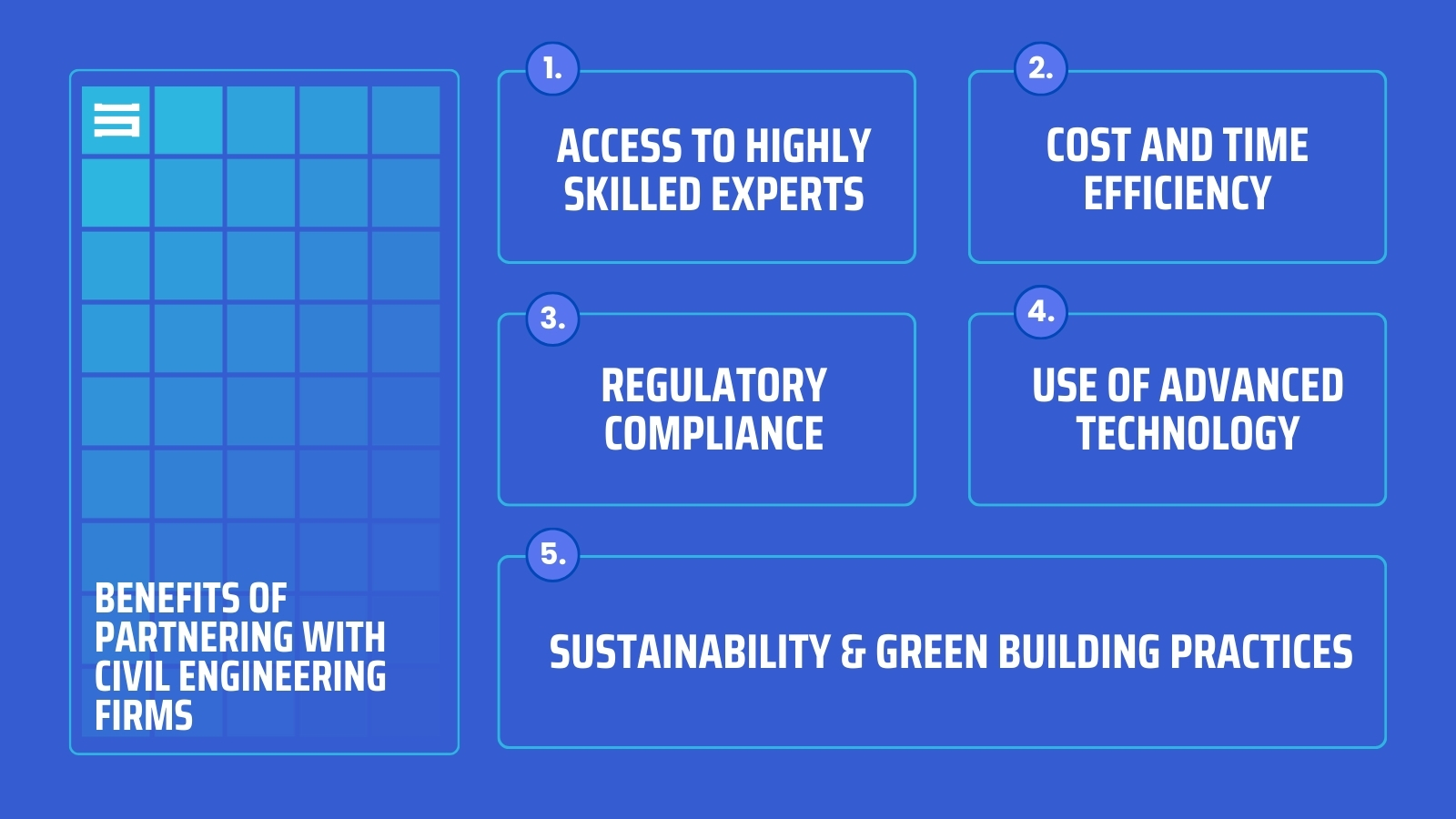
Access to Highly Skilled Experts
-
A professional firm provides certified civil engineers with expertise in structural, geotechnical, and environmental engineering.
-
They ensure error-free designs, strong risk management strategies, and cutting-edge engineering solutions.
Cost and Time Efficiency in Projects
-
EPC construction projects involve multiple phases, requiring seamless coordination.
-
Hiring a civil engineering firm reduces project delays and prevents cost overruns caused by poor planning or structural errors.
Regulatory Compliance & Risk Management
-
Building codes, environmental laws, and safety standards must be followed to avoid legal issues.
-
A professional civil engineering firm ensures that all EPC contracts meet local and international regulatory requirements.
Use of Advanced Engineering Technology
-
Civil engineering firms use modern tools such as 3D modelling, AI-powered simulations, and drone surveys to enhance construction accuracy.
-
These technologies streamline site assessment, material procurement, and project execution, improving efficiency.
Sustainability & Green Building Practices
-
The demand for eco-friendly and energy-efficient buildings is increasing.
-
A civil engineering firm incorporates sustainable solutions into the project to minimise environmental impact and enhance long-term value.
Conclusion
Civil engineering remains the cornerstone of EPC, ensuring that projects are built safely, efficiently, and sustainably. As global urbanisation accelerates and technological advancements reshape the industry, the role of civil engineers will continue to expand.
From structural stability and cost optimisation to regulatory compliance and environmental responsibility, civil engineers contribute to every aspect of an EPC project. Their expertise ensures that infrastructure is durable, efficient, and future-proof.
As we look toward 2025 and beyond, the demand for civil engineers will only increase, with new challenges and opportunities emerging in the field of smart cities, AI-driven construction, and climate-resilient infrastructure. For EPC companies looking to execute high-quality, efficient, and sustainable projects, hiring a trusted engineering firm is the best investment.
About us
At Stonehaven, we specialise in Engineering, Procurement, and Construction (EPC) services, delivering tailored infrastructure solutions that meet the demands of modern projects. Our team of expert civil engineers ensures every project is executed with precision, efficiency, and a commitment to sustainability. With extensive experience in large-scale EPC developments, we bring cutting-edge engineering solutions to the table while adhering to the highest standards of quality and regulatory compliance.
Stonehaven is built on a foundation of excellence, innovation, and trust. Every project we undertake is designed to maximise efficiency and deliver long-term value. From planning and procurement to construction and execution, we handle every stage seamlessly, ensuring smooth project delivery with minimal risks and maximum results.
Partner with Stonehaven for world-class EPC services that prioritise quality, sustainability, and operational excellence.









